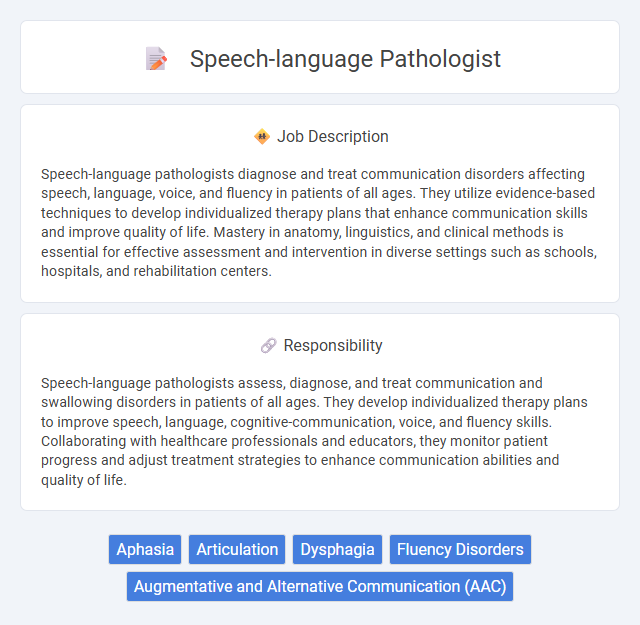
Speech-language pathologists diagnose and treat communication disorders affecting speech, language, voice, and fluency in patients of all ages. They utilize evidence-based techniques to develop individualized therapy plans that enhance communication skills and improve quality of life. Mastery in anatomy, linguistics, and clinical methods is essential for effective assessment and intervention in diverse settings such as schools, hospitals, and rehabilitation centers.
Individuals with strong communication skills and a passion for helping others may find a speech-language pathologist role highly suitable, especially those who are patient and empathetic toward people with speech, language, and swallowing disorders. People who thrive in structured, detail-oriented environments and can handle emotional situations are likely to adapt well to the challenges of this profession. However, those uncomfortable with irregular work hours or emotionally demanding interactions might face difficulties maintaining long-term job satisfaction in this field.
Qualification
Speech-language pathologists typically hold a master's degree in speech-language pathology and must obtain state licensure to practice clinically. Certification from the American Speech-Language-Hearing Association (ASHA), such as the Certificate of Clinical Competence (CCC-SLP), is highly preferred and often required by employers. Clinical experience through supervised internships or residencies is essential for developing practical skills and meeting credentialing standards.
Responsibility
Speech-language pathologists assess, diagnose, and treat communication and swallowing disorders in patients of all ages. They develop individualized therapy plans to improve speech, language, cognitive-communication, voice, and fluency skills. Collaborating with healthcare professionals and educators, they monitor patient progress and adjust treatment strategies to enhance communication abilities and quality of life.
Benefit
Speech-language pathologists likely experience significant benefits such as job stability and a growing demand in healthcare and educational settings. The profession may offer fulfilling opportunities to improve clients' communication abilities, enhancing their quality of life. Competitive salaries and flexible work environments could further contribute to the appeal of this career.
Challenge
Speech-language pathologists likely face challenges involving diverse patient needs that require tailored communication strategies and adaptive therapy techniques. The probability of encountering complex cases, such as neurological disorders or severe speech impairments, may demand continuous learning and specialized skills. Managing emotional and cognitive aspects alongside speech issues could add further difficulty to delivering effective treatment plans.
Career Advancement
Speech-language pathologists can advance their careers by obtaining specialized certifications, such as in pediatric or neurogenic speech disorders, which enhance their expertise and marketability. Pursuing a master's or doctoral degree in communication sciences and disorders opens opportunities for clinical supervisor or academic roles. Leadership positions in healthcare settings and involvement in research projects further contribute to professional growth and higher earning potential.
Key Terms
Aphasia
Speech-language pathologists specializing in aphasia diagnose and treat language impairments caused by brain injury or stroke. They develop personalized therapy plans to improve communication skills, including speaking, comprehension, reading, and writing. Their expertise in neurogenic language disorders is crucial for enhancing patients' quality of life and promoting effective rehabilitation.
Articulation
Speech-language pathologists specializing in articulation assess and treat speech sound disorders, helping clients improve clarity and intelligibility. They design individualized therapy plans targeting phonetic placement and production, often utilizing evidence-based techniques like phonological therapy and motor speech interventions. Proficiency in diagnosing articulation errors and applying corrective exercises enhances communication skills and overall quality of life for diverse populations.
Dysphagia
Speech-language pathologists specializing in dysphagia assess and treat swallowing disorders across all age groups, utilizing evidence-based techniques to improve safety and efficiency during swallowing. They work closely with medical teams to develop personalized treatment plans targeting muscle strengthening, swallowing coordination, and dietary modifications. Mastery of instrumental assessments such as videofluoroscopic swallow studies (VFSS) and fiberoptic endoscopic evaluation of swallowing (FEES) is essential for accurate diagnosis and treatment planning.
Fluency Disorders
Speech-language pathologists specializing in fluency disorders assess, diagnose, and treat stuttering and other speech disruptions, employing evidence-based techniques such as fluency shaping and stuttering modification therapy. They work across diverse populations, including children and adults, to improve communication effectiveness and reduce the psychosocial impact of fluency challenges. Utilization of advanced diagnostic tools and personalized treatment plans enhances patient outcomes in clinical settings, schools, and rehabilitation centers.
Augmentative and Alternative Communication (AAC)
Speech-language pathologists specializing in Augmentative and Alternative Communication (AAC) assess, develop, and implement communication strategies for individuals with speech impairments using high-tech devices and low-tech tools. They customize AAC systems such as speech-generating devices, picture exchange systems, and communication boards to enhance patients' ability to communicate effectively in daily activities. Expertise in AAC intervention results in improved social interaction, academic participation, and overall quality of life for clients with complex communication needs.
 kuljobs.com
kuljobs.com